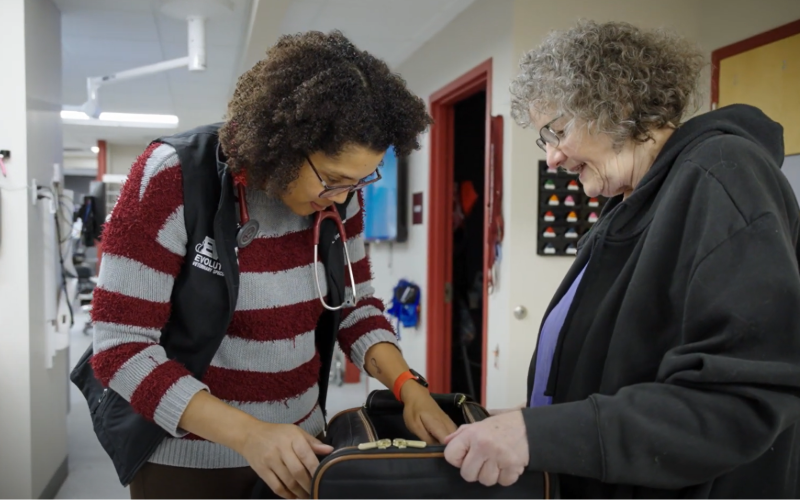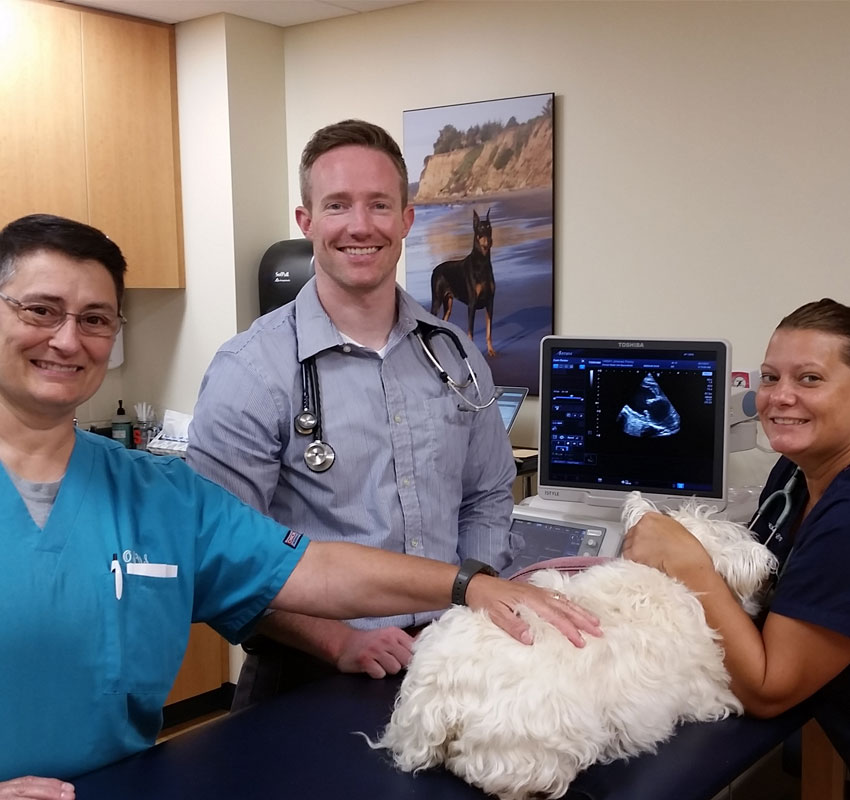Checking Out the Crucial Providers Supplied by a Veterinary Cardiologist: Understanding Ultrasound and CT Scan Methods
Vet cardiologists play an essential role in the health of pets by diagnosing and dealing with numerous heart problems. They make use of sophisticated imaging methods, such as heart ultrasound and CT scans, to offer precise examinations. Each technique has its distinct benefits and applications. Recognizing these strategies is necessary for pet dog proprietors seeking the ideal take care of their buddies. What factors should pet dog owners take into consideration when selecting between these analysis tools?

The Duty of Veterinary Cardiologists in Pet Health Care
Vet cardiologists play a crucial function in the medical care of pet dogs, concentrating specifically on identifying and dealing with heart-related conditions. They have specialized training that enables them to interpret complicated diagnostic tests and determine different cardio issues. These specialists utilize advanced techniques, such as echocardiography and electrocardiography, to assess heart feature and framework accurately.Veterinary cardiologists likewise develop customized treatment plans that may include medications, lifestyle modifications, and, in many cases, medical interventions. Their knowledge includes informing pet dog owners about heart health and wellness, stressing the importance of regular check-ups and early detection of potential troubles. Cooperation with basic veterinarians is important, as it guarantees extensive treatment for family pets with presumed cardiac issues. By offering specialized solutions, veterinary cardiologists significantly boost the lifestyle for family pets and supply tranquility of mind for their owners, reinforcing the relevance of heart health and wellness in general family pet wellness.
Common Cardiac Concerns in Pet Dogs
Common cardiac issues in family pets can considerably impact their health and lifestyle. Heart whisperings, numerous sorts of cardiomyopathy, and congenital heart problems are among the most widespread problems that veterinarians experience. Cancer Veterinary Near Me. Recognizing these problems is crucial for family pet owners to ensure timely medical diagnosis and proper therapy
Heart Murmurs in Pets
Although heart murmurs can be a resource of worry for pet owners, they are not always a sign of major wellness issues. A heart whispering is an irregular sound created by turbulent blood flow within the heart. In pets, these murmurs can be brought on by various elements, consisting of hereditary heart issues, valve problems, or perhaps stress and anxiety during evaluations. Numerous pets with heart murmurs lead normal lives without substantial health and wellness effects. To identify the underlying cause, veterinary cardiologists usually employ diagnostic strategies such as echocardiograms and Doppler ultrasounds. Early detection and evaluation are essential, as they may help handle any type of prospective heart concerns properly. Animal proprietors are urged to consult their vet for a comprehensive examination if a heart whispering is discovered.
Cardiomyopathy Kind Explained
Cardiomyopathy encompasses a team of conditions impacting the heart muscular tissue, bring about compromised cardiac function in pet dogs. One of the most typical kinds include expanded cardiomyopathy (DCM), hypertrophic cardiomyopathy (HCM), and restrictive cardiomyopathy (RCM) DCM mostly affects dogs, triggering the heart to expand and deteriorate, which lessens its capacity to pump blood efficiently. On the other hand, HCM is a lot more widespread in felines, identified by the thickening of the heart wall surfaces, commonly resulting in blocked blood flow. RCM, though less common, happens when the heart muscle mass ends up being rigid, restricting its capacity to load with blood. Each type offers distinct difficulties in medical diagnosis and therapy, demanding specialized veterinary cardiological assessment to guarantee peak monitoring and treatment for affected pets.
Genetic Heart Defects
Genetic heart flaws represent a significant group of heart concerns in family pets, distinctive from obtained conditions such as cardiomyopathy - CT Scans For Animals. These flaws are structural abnormalities existing at birth, impacting the heart's normal feature. Usual kinds include license ductus arteriosus, ventricular septal issues, and pulmonic stenosis. Signs and symptoms may differ commonly, varying from moderate to serious, and can consist of workout intolerance, coughing, and problem breathing. Early medical diagnosis with innovative imaging techniques like ultrasound is important for reliable administration. Veterinary cardiologists play a crucial duty in determining these problems and recommending proper treatment options, which may consist of clinical management or medical intervention. Acknowledging congenital heart problems allows for much better results and improved lifestyle for influenced pet dogs
Comprehending Heart Ultrasound: How It Functions
A considerable number of veterinary methods currently utilize cardiac ultrasound as a crucial diagnostic tool for assessing heart health and wellness in pets. This non-invasive technique makes use of high-frequency audio waves to produce photos of the heart's structure and feature. Throughout the treatment, a veterinary technician applies a gel to the animal's breast and utilizes a transducer to discharge ultrasound waves. These waves bounce off the heart and bordering frameworks, generating real-time photos on a monitor.Veterinarians can examine various facets of cardiac wellness, including chamber dimension, wall movement, and valve feature. Furthermore, cardiac ultrasound enables the discovery of irregularities such as liquid build-up and hereditary heart defects. This method is vital for diagnosing conditions that may not show up with common radiographs. By supplying comprehensive information about the heart's composition and performance, heart ultrasound aids in developing efficient treatment prepare for pets dealing with heart problem.
The Importance of CT Scans in Detecting Heart Issues
Just how do CT scans improve the diagnosis of find this heart disease in vet medication? CT scans give in-depth cross-sectional photos of the heart and bordering frameworks, enabling vets to imagine complicated anatomical connections. This imaging method is particularly useful in recognizing congenital heart flaws, heart lumps, and abnormalities in capillary. By utilizing advanced imaging formulas, CT scans can assess heart chamber sizes and feature, providing a comprehensive view that might be difficult to attain with traditional methods.Additionally, CT angiography can imagine blood circulation and recognize locations of stenosis or blockage, which is essential for top article planning potential interventions. The speed and precision of CT scans additionally facilitate quick diagnoses, essential in emergency situations. Inevitably, the consolidation of CT checks right into vet cardiology substantially improves the accuracy of medical diagnoses, allowing targeted therapy strategies and improving individual end results for pets enduring from heart disease.
Comparing Ultrasound and CT Scan Methods
While both ultrasound and CT scans are important devices in vet cardiology, they provide distinctive benefits and limitations that affect their use in diagnosing heart disease. Ultrasound, or echocardiography, provides real-time imaging of the heart's framework and feature, allowing vets to assess heart chambers, valves, and blood flow. It is particularly efficient for reviewing problems like heart disease and cardiomyopathy. Nevertheless, ultrasound may be limited in imagining specific physiological structures due to client dimension or obesity.In comparison, CT checks offer in-depth cross-sectional images of the heart and bordering tissues, making them perfect for recognizing architectural problems, growths, or vascular problems. Although CT scans provide comprehensive understandings, they require sedation and may entail radiation exposure. Inevitably, the choice between ultrasound and CT checks relies on the details medical scenario, the individual's problem, and the details needed for a precise diagnosis.
Therapy Alternatives Readily Available Via Veterinary Cardiology
Veterinary cardiology uses a variety pop over to this web-site of therapy options tailored to deal with numerous heart problems in animals. Therapy strategies frequently start with way of life adjustments, including diet modifications and workout adjustments, focused on enhancing general heart wellness. Drugs play an essential duty, with cardiologists prescribing drugs such as diuretics, beta-blockers, and ACE preventions to boost and handle signs and symptoms heart function.In extra extreme situations, interventional procedures, such as balloon valvuloplasty or stent placement, might be needed to alleviate clogs or boost blood circulation. For sure congenital heart flaws, medical options might be discovered to correct architectural problems. In addition, continuous surveillance and follow-up care are crucial components of a thorough treatment plan, enabling timely changes based upon the pet's action to therapy. In general, veterinary cardiology focuses on providing effective, individualized like maximize the health and wellness and well-being of animal people with heart conditions.
Exactly how to Prepare Your Family Pet for a Heart Evaluation
Preparing an animal for a cardiac examination is necessary to assure accurate outcomes and a smooth process. Owners ought to first set up the consultation with the veterinary cardiologist and go over any specific needs or concerns. It is a good idea to keep food for at the very least 12 hours prior to the analysis, as this assists improve imaging top quality during treatments like ultrasound or CT scans.Additionally, maintaining a tranquil environment on the day of the appointment can help in reducing the pet's anxiousness. It is useful to bring along any kind of relevant clinical documents, including previous examinations and medicines (CT Scans For Dogs). Owners should additionally make sure that their animal fits and leashed throughout transport to the facility. Finally, acquainting themselves with the analysis procedure can minimize concerns and help in asking notified concerns throughout the consultation. By adhering to these steps, proprietors can contribute considerably to the effectiveness of the heart analysis
Regularly Asked Concerns
The length of time Does a Cardiac Ultrasound or CT Scan Take?
The duration of a cardiac ultrasound generally varies from 30 to 60 minutes, while a CT scan might take roughly 15 to 30 mins. Factors such as the client's problem can influence these time quotes.

Are There Any Threats Linked With These Diagnostic Treatments?

Can I Stick With My Pet During the Treatment?
The veterinary center's policy generally determines whether family pet owners can stay throughout treatments. While some clinics encourage proprietor presence for comfort, others might call for splitting up to ensure safety and perfect problems for diagnostic imaging.
Exactly how Much Do These Diagnostic Examinations Commonly Cost?
The prices of diagnostic examinations, such as ultrasound and CT scans, generally differ based on location and center. Normally, rates range from a few hundred to over a thousand dollars, reflecting the complexity and technology entailed.
What Is the Recovery Process After a Cardiac Examination?
The recuperation process after a heart analysis entails keeping track of the animal for any instant reactions, ensuring convenience, and restricting exercise. Vets commonly offer post-evaluation instructions to guide animal proprietors during this vital recuperation duration. Heart murmurs, various kinds of cardiomyopathy, and congenital heart flaws are amongst the most widespread conditions that vets run into. A heart murmur is an abnormal noise generated by turbulent blood flow within the heart. Cardiomyopathy encompasses a team of conditions impacting the heart muscle, leading to jeopardized heart feature in pet dogs. Hereditary heart issues represent a substantial group of cardiac concerns in pet dogs, distinctive from obtained problems such as cardiomyopathy. Ultrasound, or echocardiography, offers real-time imaging of the heart's structure and function, permitting veterinarians to examine heart chambers, shutoffs, and blood flow.
Comments on “Benefits of Early Diagnosis With a Board Certified Veterinary Cardiologist}”